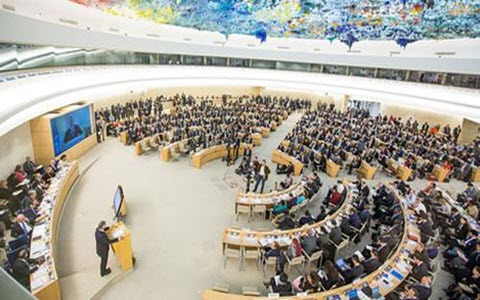UN Human Rights Council Extends Mandate of Special Rapporteur on Human Rights in Iran

Written by
Shamsi Saadati
UN Human Rights Council – Geneva
The United Nations Human Rights Council, during its session on June 22, extended the mandate of Javaid Rehman, the Special Rapporteur on the situation of human rights in Iran.
While referring to the OHCHR resolution from 2011 until now, and the regime’s lack of cooperation and increase of human rights violations, the Council decided to extend Mr. Rehman’s mandate for another year.
Before the voting started, Denmark’s representative expressed concern over the human rights situation in Iran, particularly the regime’s ongoing use of capital punishment, and urged the Special Rapporteur to closely monitor the human rights situation in Iran.
In this resolution, the Council urged the Iranian regime to “cooperate fully with the Special Rapporteur and to permit access to visit the country and to provide all information necessary to allow the fulfilment of the mandate.”
While trying to cover up the deplorable human rights conditions, and infuriated over this resolution, the regime’s Ministry of Foreign Affairs claimed that this resolution is based on a “selective attitude and political goals.” The regime’s Judiciary, which is directly involved in human rights violations, on its affiliated Mizan website on Monday wrote: “The Human Rights Council has agreed to extend Javaid Rehman’s mandate. While his reports about Iran have been completely biased.”
Previously, Mr. Rehman, in a report released on February 19, said he was shocked at the number of deaths, acute injuries, and ill-treatment of persons detained during the November Iran protests.
Rights groups, such as the Iran Human Rights Monitor (Iran HRM) that closely monitors human rights situation in Iran, have issued various reports on the Iranian regime’s gross human rights violations. Iran HRM on June 14 reported that “More than 100 inmates have been executed in Iran from January to mid-June 2020.” “At least 30 of these executions have been announced by official and semi-official press and media, and the other 79 were carried out in secret. At least two women were hanged in January 2020. One of them was identified as Maliheh Haj Hassani, hanged in Adelabad Prison in Shiraz, capital of Fars Province, southern Iran. The state-run press identified the other woman by her first name, Sara. The women, 32, was hanged in the Central Prison of Mashhad, capital of Razavi Khorasan Province, northeastern Iran.”
In its monthly report of May 2020, Iran HRM wrote: “In a new wave of crackdown in Iran, the Ministry of Intelligence and Security (MOIS) and the IRGC Intelligence Organization have begun arresting and summoning large numbers of young activists, especially the families and supporters of the People’s Mojahedin Organization of Iran (PMOI/MEK). Many have been sent to prisons, and some have been temporarily released on bail while signing a form pledging not to participate in any anti-regime activities. Among those arrested were Ali Younesi and Amir-Hossein Moradi, award-winning students at Sharif University of Technology, who have been arrested and detained on trumped-up charges of having ties with the PMOI/MEK.”
Fearing the restive Iranian society, the regime has resorted to more violence to quell the society. The regime continues its human rights violations, particularly executions, arbitrary arrests and mistreating prisoners, because one of the regime’s pillars of existence and only way to prolong its life is oppression. Now Iranian prisoners, particularly political prisoners and those arrested during the November protests, along with COVID-19 crisis, are at imminent threat of execution and torture. Therefore, it is the international community’s responsibility to act to avoid a humanitarian catastrophe.
Mrs. Maryam Rajavi, the president-elect of the National Council of Resistance of Iran (NCRI), has repeatedly urged the UN Secretary General to “dispatch an international fact-finding mission to Iran to investigate the conditions of death and injury of protesters in November and visit Iranian prisons and prisoners.”

